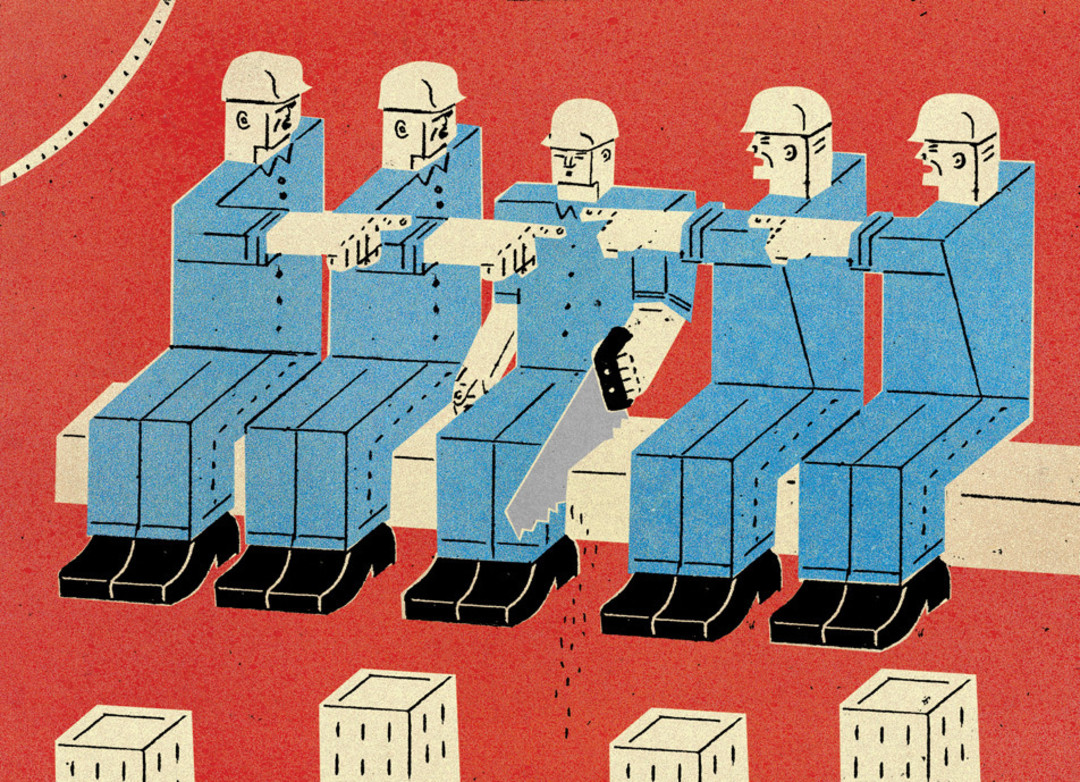Gorilla Warfare

Image: David Plunkert
BUSINESS GROUPS ARE a shadow government, a parallel world of lobbyists, policy wonks, and ex-officials laboring to influence the government we all see. Usually they operate quietly, bending ears and twisting arms to shape laws and regulations in the interests of their members. Usually they play both sides of the political aisle—especially the side in power.
The Building Industry Association of Washington (BIAW), one of this state’s largest and best-funded trade groups, plays the game a little differently. Dispensing with the usual niceties, it rages fearlessly against regulation, environmentalism, liberalism, and their mouthpieces in the legislature and state government. Its mission is to “fight against a government that has made this industry one of the most regulated in the nation.” Its newsletter and blog (“The Hammer”) often read like local versions of Rush Limbaugh or Fox News. They’ve called Governor Chris Gregoire “delusional” and a “power-hungry she-wolf.” They say global warming’s a bogus problem, but don’t worry: “Conservatives are having babies and liberals are not, which means that eventually conservatives will outnumber liberals.”
All this may be red meat to many of the BIAW’s 12,500 builder members, who tend to mistrust government and fear regulation. But it’s got the association’s largest local chapter, the Master Builders of King and Snohomish Counties, very worried. And it’s opened a rift that threatens to tear the builders’ association apart—or, maybe, transform it into a more mainstream, diplomatic, and effective player in the shadow government of business groups.
Sam Anderson, the Master Builders’ executive officer, doesn’t mince words either: “[BIAW leadership] says it’s there to protect small business as the last conservative voice in the state of Washington. I say baloney! The BIAW is there to represent its members!”
Those members have a big stake in many measures likely to come up in the new legislative session: mandatory home warranties, contractor licensing standards, higher sales taxes and workmen’s comp dues, required sprinklers in new homes, increased energy-efficiency standards. Consumer and environmental groups and the legislators pushing these reforms contend they’re needed to shore up state finances, protect homebuyers from shoddy construction and fly-by-night builder’s and combat climate change. But the industry, which has suffered more than most in the current downturn, fears such measures will make it even harder for them to do business.
To head them off, the BIAW has spent big money on state elections: $7.8 million last year, including more than $6 million on Dino Rossi’s race for governor. The year before, it spent big trying to unseat Washington Supreme Court Chief Justice Gerry Alexander and another justice it deemed too liberal.
That outlay fizzled at the polls: The justices kept their posts. Rossi didn’t win his. The state Public Disclosure Commission tagged the BIAW for campaign-finance violations, and Attorney General Rob McKenna slapped down a $900,000 fine. The BIAW promptly labeled the Public Disclosure Commission and the attorney general’s office “corrupt, oppressive agencies”—and risked alienating McKenna, state Republicans’ fastest-rising star and an early front-runner for their 2012 gubernatorial nomination.
{page break}
Brian Minnich, the BIAW’s director of legislative affairs and an affable fellow himself, insists hardball politicking and raging rhetoric are necessary weapons to defend builders who are oppressed by “the 800-pound gorilla” of government: “Members want someone who’s aggressive. They want their own gorilla they know is fighting for them.”
Such tactics don’t win the BIAW many friends among the Democrats who currently control both legislative houses and the governor’s mansion. “They have zero influence on my caucus,” says one powerful Democratic senator, Mary Margaret Haugen, a frequent target of BIAW attacks. “In fact, most [senate Democrats] go out of their way to go against them. Legislation is a matter of compromise, and they don’t compromise. They show no respect. I don’t even meet with them.”
Seattle-area builders worry that the BIAW’s scorched-earth approach costs them influence in Olympia.
On the House side, the BIAW has stayed chummy with at least one Democrat—the most powerful of all, Speaker Frank Chopp, to the exasperation of his liberal colleagues. But that could change, if Chopp switches positions on an issue near the hearts and dear to the balance sheets of the builders and other business groups: a controversial scheme called retro payments.
Much of the BIAW’s political advocacy is funded by “retrospective rating” payments from the state Department of Labor and Industries. These payments are actually refunds of excess workmen’s comp premiums that employers, in this case builders, have paid. L&I funnels these to industry groups. The BIAW keeps 10 percent—about $4.3 million in 2008—of the builders’ retro refunds for itself and another 10 percent for its chapters, and passes the rest on to the employers.
The retro payments are intended to promote workplace safety, but the state doesn’t police how they’re spent—which means BIAW can use them to fund its political advocacy. Some legislators want to bar such use and return all the payments to the employers. Chopp has blocked previous efforts at retro reform. But he reportedly told a Seattle audience in November that he might now support it. House Majority Leader Lynn Kessler, a Chopp protege, suggests he might be biding his time: “Frank picks his fights. He’s very strategic.” If he does clamp down on retro payments, look for attacks on him in “The Hammer.”
The payments have also become a point of contention between the BIAW and its Seattle-area chapter. The King-Snohomish Master Builders—about 30 percent of total BIAW membership—take many of the same antiregulatory positions as their parent group; they supported -Rossi and, for King County executive, Susan Hutchison. But the Master Builders have also supported Ron Sims, Greg Nickels, and other Democrats they consider “pro-housing.” And, rather than railing against overbearing government regulation, they collaborated with local governments and (gasp) environmental groups to create the much-lauded Built Green program, which certifies sustainable building practices and practitioners.
{page break}
The Seattle-area builders worry that the BIAW’s scorched-earth approach costs them influence in Olympia: “We’ve got to work with whoever’s in a position to affect our industry,” says Anderson, their chief officer. “Our fear was that we’d have no representation except with the Republican minority.” And so they decided to get their own representation: In the run-up to the 2009 legislative session, they set out to hire “the best Democratic lobbyist we could get.” They settled on Len McComb, a former state budget director who worked with Gregoire when she was attorney general. The Pierce County Master Builders also hired their own lobbyist.
“It’s worked out well,” says Anderson. “Len opened a lot of doors for us and our industry.” McComb arranged meetings with Gregoire (“She’d had no one to talk to about building issues”), Haugen, U.S. Senator Patty Murray, and Congressman Rick Larsen. Later, Haugen effectively torpedoed that session’s bid to pass a Home-owner’s Bill of Rights, which the builders opposed; she says she acted on the bill’s merits, in the best interests of her district.
Whatever bridges McComb built in the statehouse, his hiring by the Master Builders drove BIAW leaders to the barricades. At their quarterly meeting in June, they tried to discipline the wayward Seattle—area builders: The BIAW voted that any chapters that want to retain outside lobbyists must first get the approval of its board and legislative policy group. Otherwise it would withhold those chapters’ share of the retro payments—which would have cost the King—Snohomish Master Builders about $800,000 last year.
In November the association gathered for another quarterly meeting. This time, the King-Snohomish and Pierce Master Builders duly asked permission to again deploy their own lobby-ists. The BIAW’s legislative policy committee said okay, but the board didn’t vote; several members mysteriously left early, leaving no quorum. “I think it was by design,” says Anderson.
That leaves the Master Builders to act on their own and risk losing the retro bucks. “Our position is that they don’t have any power to withhold payments for ideological reasons,” says Anderson. “We’ve shown it to lawyers, and they agree.”
If the impasse continues, “I don’t see why the Master Builders wouldn’t just set up their own organization,” says Representative Kessler, whose own husband is a builder. “Easier said than done,” says Anderson. If they do, they’ll drastically diminish the BIAW’s war chest for conservative candidates and causes.



